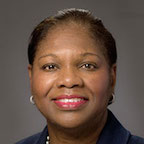 The board of trustees of Hamline University in St. Paul, Minnesota, has named Fayneese Miller as the 20th president of the educational institution. When she takes office on July 1, she will be the first African American to lead the university.
The board of trustees of Hamline University in St. Paul, Minnesota, has named Fayneese Miller as the 20th president of the educational institution. When she takes office on July 1, she will be the first African American to lead the university.
Hamline University enrolls about 2,100 undergraduate students and 2,400 graduate students. Blacks make up 6 percent of the undergraduate student body.
Dr. Miller currently serves as dean of the College of Education and Social Services and professor of leadership and developmental sciences at the University of Vermont. She has been on the faculty at the University of Vermont for nearly a decade. Previously, she taught at Brown University in Providence, Rhode Island, for 20 years, where she was the founding chair of the ethnic studies program. At Brown, Dr. Miller was the first native-born African American woman to be appointed associate professor with tenure.
Professor Miller is a graduate of Hampton University in Virginia, where she majored in psychology. She holds a master’s degree and a Ph.D. in experimental psychology from Texas Christian University in Fort Worth.











Interesting article, but, why the need to metnion that she was the first ‘native-born’ African American? I understand there are different perceptions about this, but isn’t this the Journal of Blacks in Higher Education? Does ethnicity matter?
Re: Mrs. Brown-Crawford,
The purpose of noting that Dr. Miller is a native born African American women because one can see the preponderance of foreign born African immigrants who hold similar positions at HWCUs. Not to mention that most (not all of course) educated foreign born African immigrants are so inclined to view themselves as “different” (or separate) from native born African Americans due to miseducation, colonialism, neo-colonialism along with the effectiveness of historical propaganda.
Let’s be honest for a moment, the majority of HWCUs are not threaten (in any form) by foreign born African immigrants because they( most Whites) know the majority are not fully aware of the complexities of American racism. Thereby, those at the HWCUs can conduct themselves in any manner they without being challenged as compared if it was a native born African American who is a constant reminder to White America of its racism towards native born Blacks.
Further, you pointed “does ethnicity matter”, of course it does in the sense if one is trying to intimately inspire those who identify themselves as native born African American. It’s no more different than those hailing from the various islands( Trinidad, Jamaica, Bahamas, Barbados, etc. ) who differentiate themselves.
A large percentage of foreign-born Blacks believe that native-born Black are somewhat lazy and fail to take advantage of the opportunities that we have in the country. African-Americans tend to make excuses for not succeeding in this country.